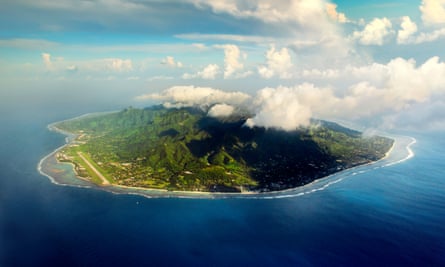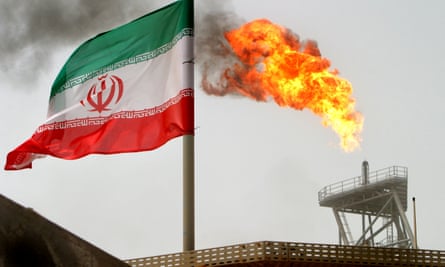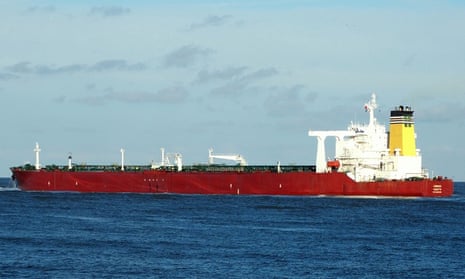Two tankers flying the flag of the Cook Islands have been scrubbed from the islands’ shipping registry after allegations the vessels were sanctions-busting, transporting Iranian crude oil while concealing their movements.
US sanctions on Iran’s oil and gas sector have, somewhat improbably, caught up the tiny Cooks archipelago on the other side of the world.
Prior to Covid-19, the economy of the Cook Islands – 15 islands scattered across nearly 2m sqkm of ocean in the South Pacific – was dominated by tourism.
Along with fisheries and an opaque offshore finance industry, a national ship registry has played a minor role in furthering the goal of economic diversification for the remote nation, providing a handful of jobs and a trickle of revenue for the federal treasury.
But by offering shipowners a flag of convenience, the country of just 17,500 people has become involved in one of the world’s most contested foreign policy issues.
The modest first-floor office of Maritime Cook Islands, the ship registry operator, sits on the shores of a lagoon on the island of Rarotonga.

But last year, registry officials were given satellite images of three oil tankers, flagged to the Cook Islands, by the New York-based anti-Iran lobby group United Against Nuclear Iran (UANI).
According to UANI, the images showed the vessels allegedly engaged in the subterfuge shipping of Iranian crude oil: a practice carried out by under-the-radar logistical networks that defy US sanctions on Tehran and attempt to evade the watchful eye of American authorities.
Shipping industry news outlet Lloyd’s List has said subterfuge shipping has proliferated in recent years, as some shipowners capitalise on blackmarket demand to keep oil flowing from sanctioned nations such as Iran and Venezuela.
A flag essentially allows a vessel to conduct business on global waterways and to make port calls. In an effort to evade authorities some ships will engage in ‘flag-hopping’, where they swap national flags to avoid being held accountable for their actions or cargoes.
Two of the vessels identified are alleged to have flag-hopped.
“The satellite images of the vessels in October showing the alleged breaches occurred before the vessels registered with the Cook Islands,” registry director Glenn Armstrong said.
He alleged, as well, at the time of the alleged shipment, the ships “went dark”, switching off their location tracking automatic identification system (AIS). Any investigation was now “moot”, Armstrong said, as the penalty for switching off AIS was deletion from the Cook Islands registry.
The two vessels were delisted in February. The third tanker remains on the registry as it has yet to be implicated in any illicit activity and has kept its AIS on, Armstrong said.
UANI researchers claim one of the tankers delisted is one of the most prolific subterfuge shippers of Iranian oil and gas.
According to the group, the ship spent much of 2020 flying the flag of the Comoros Islands. The researchers said it then hopped to the Cook Islands after Comoros officials were alerted to the vessel’s “rogue behaviour” – picking up crude oil from Iran’s Kharg Island for ship-to-ship transfers.
After flying the Cooks flag for five months, thetanker then hopped to the Federated States of Micronesia in late February before raising the flag of Samoa.
UANI allege the two deregistered ships transported the most Iranian cargo of all vessels tracked by the group, carrying more than 9m barrels of Iranian crude and gas.

UANI has focused its lobbying efforts on isolating Iran diplomatically and economically to compel Tehran to abandon its nuclear ambitions. By prodding nations such as the Cook Islands and thwarting tankers that are alleged to be involved in sanctions-busting, the group believes it can hinder Iran’s ability to capitalise on its vast energy reserves.
But the veracity of the group’s intelligence, which includes data gathered from ship-tracking websites and satellite imagery, has been questioned in the past.
In 2015, a Greek shipowner launched a defamation lawsuit against UANI, claiming he was falsely accused by the group of violating sanctions. UANI defended its allegations. The lawsuit was thrown out by a district judge who agreed with the US department of justice that allowing the case to proceed would pose an ‘unjustifiable’ risk of revealing state secrets.
In the Cook Islands, far away from the congested, contested waters of the Persian Gulf, dealing with UANI is viewed by officials as a more straightforward issue.
One local official with knowledge of the matter told the Guardian, “we just do what they tell us to do”.
